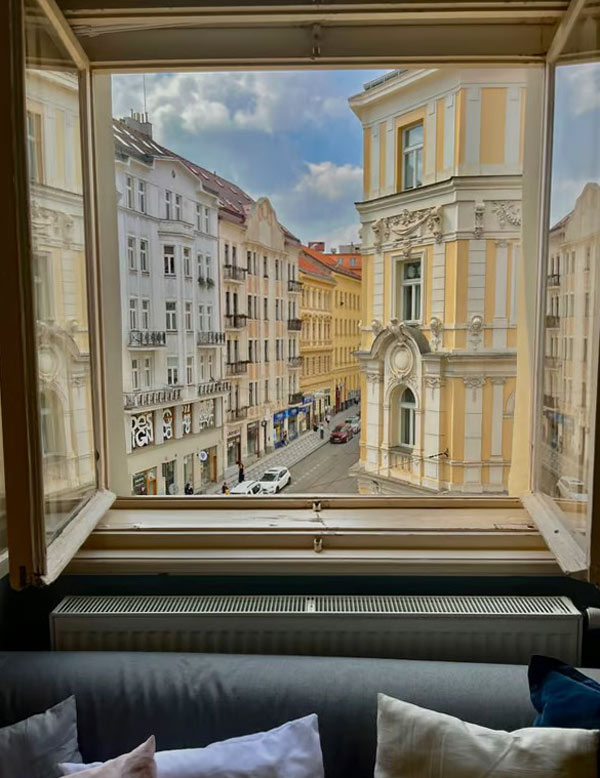Navigating Study Abroad in Prague with a Disability
As a person who is visually impaired, I struggle with getting around no matter where I am, but being in an unfamiliar environment makes it even more demanding. That is one of the key reasons I was anxious to study abroad. It is already strenuous enough to navigate a foreign country, so combining that with my poor vision makes it that much more difficult. However, I knew that I would forever regret allowing my identity as a student with a disability get in the way of experiencing an incredible, life-changing CEA CAPA Prague study abroad program. So, I set my fears aside and booked my flight without looking back.
Here are some worries that I had about studying abroad with a visual impairment that I overcame:
Receiving disability accommodations in my classes
When I first decided to spend August through December of 2022 studying abroad in the Czech Republic, I felt fearful that I would not perform as well in my classes. This stemmed from my assumption that I would not receive the same disability accommodations abroad that I had at my home university. CEA CAPA had safety and support abroad that exceeded my expectations and requested documentation of accommodation needed so they could better assist me in my classes and excursions. My professors received notice of these accommodations before the first day of class, so they were already familiar with my specific case without me having to go out of my way to make sure they were. My stress was alleviated; I no longer had to worry about my disability affecting my learning experience just because I chose to take a semester of classes in a foreign country. 
Navigating a more inaccessible world
The Czech Republic is not nearly as accessible as the U.S. Perhaps the most the country does for those with low vision (or none at all) is have auditory announcements of each stop on their public transportation. Besides that, the stoplights and pedestrian signs shut off at nighttime, the streets are cracked cobblestone that are challenging to walk on, and most buildings do not have Braille on their signs or elevators. I learned all this on my first day, so I prepared myself to spend the next few months working my way around those barriers on my daily commutes and on excursions. I knew the best way for me to familiarize myself with the city was to do exactly what I did when I moved away for college one year prior: I practiced. I did the same routes, again and again, until I could do it as if I did not have any vision whatsoever. I also memorized street names, tram schedules, and whatever else I could that would better assist me in getting from one point to another. Soon enough, I became so accustomed to the area that I considered Prague home. It was no longer the intimidating, unfamiliar city, it was now my favorite place in the world.
Despite my doubts, I quickly adapted to life in Prague; Four days in and I felt comfortable communicating my disability with my professors and peers; four weeks in and I navigated Prague completely on my own; and by four months, getting around the city was practically muscle memory. 
Asking for help when needed
As a self-proclaimed independent person, I usually try and figure things out on my own. However, there are instances when—despite my best efforts‚—I cannot figure out (or see) something on my own, so I have no other option but to seek out the help of others.
There’s a famous Romanian saying that my mother always tells me: “Cu rușinea mori de foame,” which literally means, “with embarrassment you die of hunger.” Because of my glaucoma, she knew I needed assistance in certain situations, so she told me this so that I didn't feel ashamed when those situations presented themselves. While abroad is when I realized the reality of that saying and started to repeat it to myself frequently. If I needed help reading the menu at a restaurant, I told myself that with embarrassment, you die of hunger. If I needed to know if it was safe for me to cross the street, I told myself that with embarrassment, you die of (vehicular manslaughter). If I was lost and didn’t know how to find something, I told myself that with embarrassment, you die of (being nowhere to be found). In those four months, I learned the reality of what my mother had been getting at in my nineteen years of living—the fear of embarrassment is not worth sacrificing my well-being.

Making up for what I lacked in sight
I am beyond grateful that I made the decision to study abroad in Prague with CEA CAPA. It taught me immensely about both myself and the world around me. Although I couldn't fully experience the sights of the Czech Republic, I still participated in its culture, whether it came from tasting the food, learning the history, hearing the music, or even just by taking the morning tram ride to campus. 












